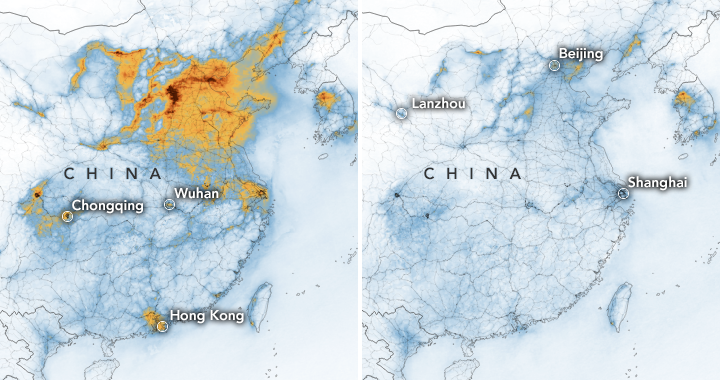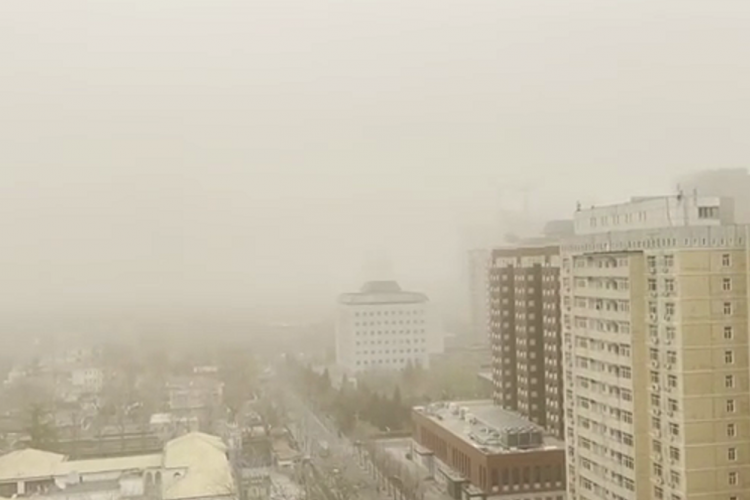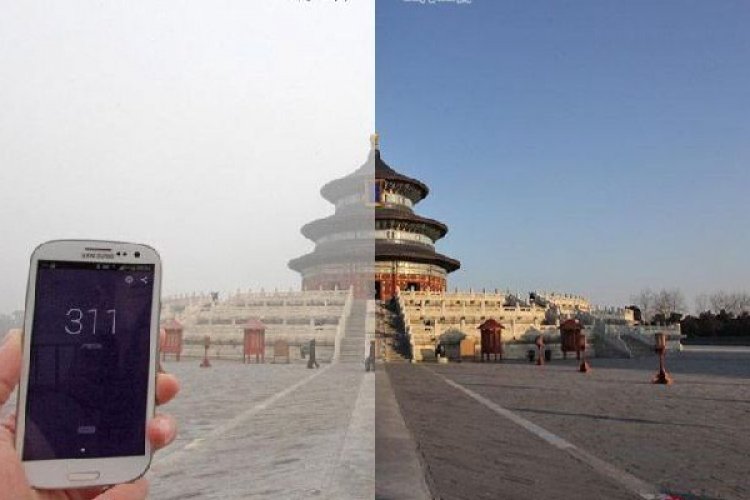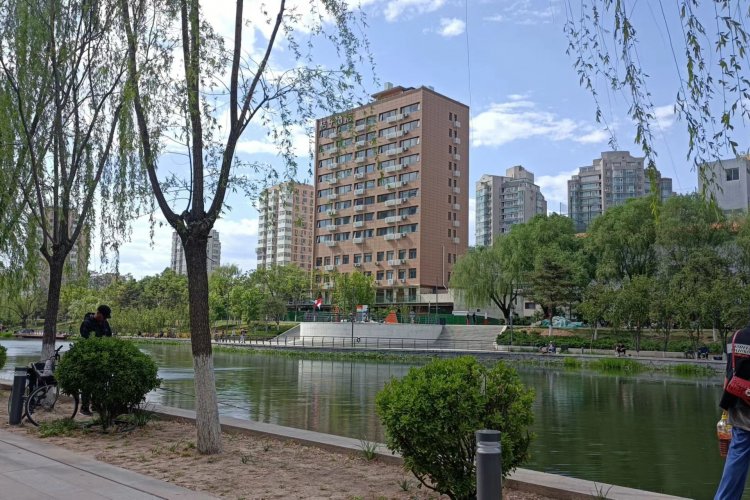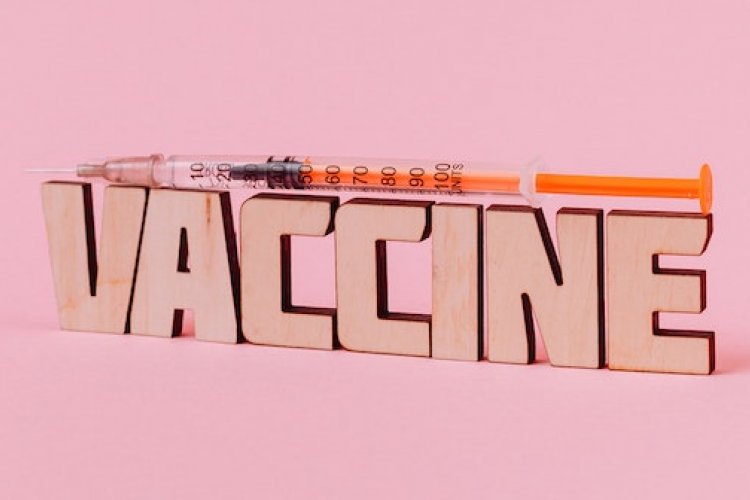Beicology: Did the Virus Cause Blue Skies? Will Worms Eat Plastic Pies?
How bad is the smog these days, really? Who is keeping tabs on the state of our drinking water? What has the government done about carbon emissions lately? In Beicology we turn our focus toward environmental news in the capital.
Pandemic credited for a dip in China’s pollution
Last month, NASA posted satellite images showing that airborne nitrogen dioxide levels have dropped dramatically over Northeastern China (including Beijing) and claimed that there was evidence to connect the coronavirus outbreak to the reduction of the deadly gas that is known to be linked with cancers as well as cardiovascular and respiratory diseases.
Stanford researcher Marshall Burke then used a mathematical model to bolster the claim, posting his calculations on the interdisciplinary academic blog G-FEED. Although the author was sure to hedge his post with the disclaimer, “None of my calculations support any idea that pandemics are good for health,” he also concluded that his work could answer the question of “whether the lives saved from this reduction in pollution caused by economic disruption from COVID-19 exceeds the death toll from the virus itself” with “a clear ‘yes.’”
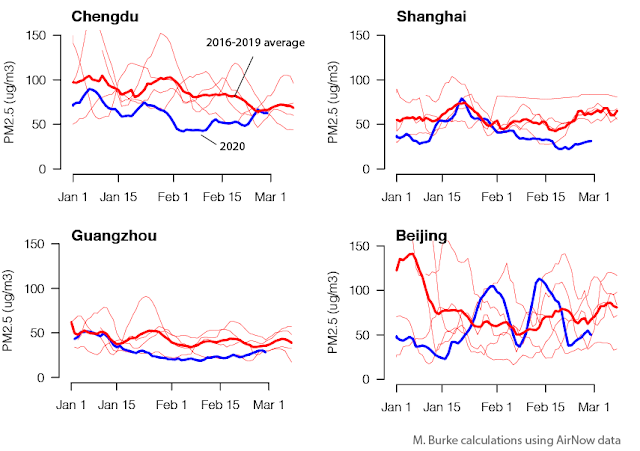
However, a few grains of salt should be taken with his conclusions. Firstly, as The Guardian pointed out a week prior to Burke’s post, the drop coincides with the Chinese New Year, which is almost always associated with a modest fall in pollution levels. Yet, Burke does not make any year-over-year comparisons. If he had, he would have discovered that this February actually saw 19 percent more pollution than February 2019.

Secondly, anyone who regularly follows Beijing’s pollution levels will know that whenever coal burning and other industrial polluters are temporarily halted, the resulting blue skies are followed by even worse smog as industries pull into overdrive to make up for the losses. In light of the current economic downturn in the United States, there is no reason we should not expect the same to happen once China has handled the pandemic situation and moves to protect its own economy, thus potentially undoing any “life-saving” cuts in pollution that we’ve seen.
That being said, there is no doubt that the outbreak has had some positive outcomes for the environment, and not just out of China – in Italy, Venice has seen clearer water, and dolphins have appeared on the country’s coast as ferries have stopped operation.
Plastic-eating worms touted as a valuable environmental solution
Plastic contains vast amounts of energy. The problem is that there aren’t enough living organisms capable of digesting plastics to solve the global landfill crisis – yet.
Small worms that can eat and digest plastics and styrofoam were discovered a few years ago, but new research from the Beijing Institute of Technology has shown that some larger worms – which the researchers call “super worms” – can process Styrofoam as well. Their extra size means that they could be a more effective tool against landfills. The researchers also say that they are working to isolate the enzymes from the worm’s gut bacteria to use in a “tool kit” for the purpose of degrading plastics.

Some plastic industry blogs latched onto the new research as a measure against the bad rap that plastics receive in environmentalist circles. For example, Plastics Today wrote that the findings “might throw a monkey-wrench into the plans of anti-plastics crusaders who want to ban plastics because they are ‘toxic’ to living beings.”
However, one such crusader, Damin Tang of Greenpeace, compared the gradual advancements to coronavirus vaccines. “You can’t put too much hope on something like that in a cut-throat situation,” he says.
Moreover, the worms may not be an end-all solution. “I think we should use caution when it comes to these end-of-pipe ideas,” says Tang, “because they might just one problem with another.” He adds that a wiser strategy would be to invest in solutions that solve the problem from the beginning. In addition to the plastic bans that China announced at the beginning of this year, such a strategy would have to include changing people’s behavior to use less and reuse more.
READ: Beicology: Pollution Makes You Bald
Images: NASA, Marshall Burke (via G-FEED), Yu Yang (via Science Direct)

